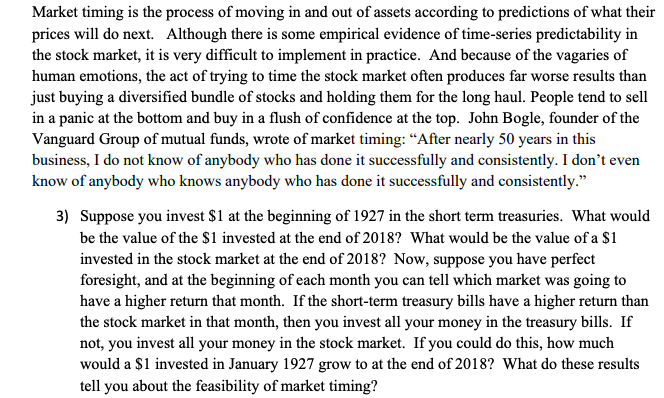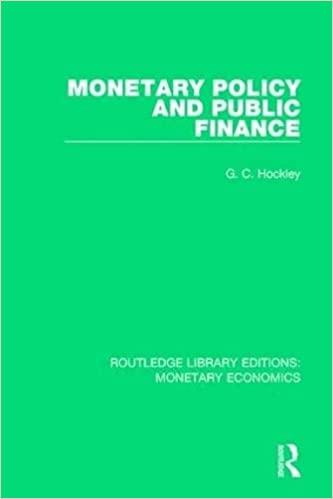
Market timing is the process of moving in and out of assets according to predictions of what their prices will do next. Although there is some empirical evidence of time-series predictability in the stock market, it is very difficult to implement in practice. And because of the vagaries of human emotions, the act of trying to time the stock market often produces far worse results than just buying a diversified bundle of stocks and holding them for the long haul. People tend to sell in a panic at the bottom and buy in a flush of confidence at the top. John Bogle, founder of the Vanguard Group of mutual funds, wrote of market timing: After nearly 50 years in this business, I do not know of anybody who has done it successfully and consistently. I don't even know of anybody who knows anybody who has done it successfully and consistently." 3) Suppose you invest $1 at the beginning of 1927 in the short term treasuries. What would be the value of the $1 invested at the end of 2018? What would be the value of a $1 invested in the stock market at the end of 2018? Now, suppose you have perfect foresight, and at the beginning of each month you can tell which market was going to have a higher return that month. If the short-term treasury bills have a higher return than the stock market in that month, then you invest all your money in the treasury bills. If not, you invest all your money in the stock market. If you could do this, how much would a $1 invested in January 1927 grow to at the end of 2018? What do these results tell you about the feasibility of market timing? Market timing is the process of moving in and out of assets according to predictions of what their prices will do next. Although there is some empirical evidence of time-series predictability in the stock market, it is very difficult to implement in practice. And because of the vagaries of human emotions, the act of trying to time the stock market often produces far worse results than just buying a diversified bundle of stocks and holding them for the long haul. People tend to sell in a panic at the bottom and buy in a flush of confidence at the top. John Bogle, founder of the Vanguard Group of mutual funds, wrote of market timing: After nearly 50 years in this business, I do not know of anybody who has done it successfully and consistently. I don't even know of anybody who knows anybody who has done it successfully and consistently." 3) Suppose you invest $1 at the beginning of 1927 in the short term treasuries. What would be the value of the $1 invested at the end of 2018? What would be the value of a $1 invested in the stock market at the end of 2018? Now, suppose you have perfect foresight, and at the beginning of each month you can tell which market was going to have a higher return that month. If the short-term treasury bills have a higher return than the stock market in that month, then you invest all your money in the treasury bills. If not, you invest all your money in the stock market. If you could do this, how much would a $1 invested in January 1927 grow to at the end of 2018? What do these results tell you about the feasibility of market timing







